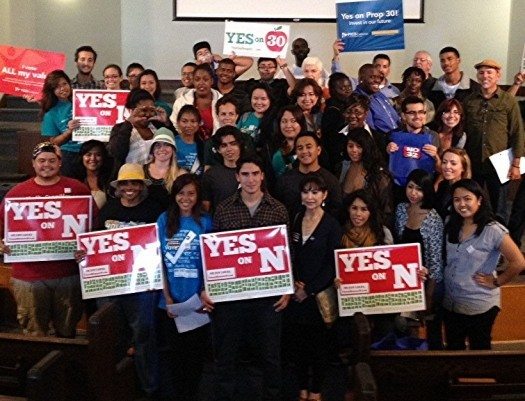
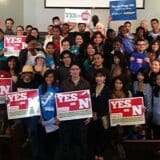
On Sunday the Los Angeles Times published a story about the important successes of campaigns to pass local minimum wage and living wage laws. However, while highlighting new developments that will impact local economies and the lives of workers, the Times missed the real story and forces behind this growing trend.
The piece focused on two ballot-box victories for living wage laws: a minimum wage for hotel workers in Long Beach and a citywide minimum wage increase in San Jose.
“The victories put these two California cities on the cusp of an emerging trend,” wrote Wesley Lowery. “Ballot initiatives, labor experts say, have the potential to rewrite labor’s playbook for how to win concessions from management.” Throughout the piece, Lowery presented the minimum wage ballot measures as a tactic put in place and managed from behind the scenes by labor leaders.
In fact,
» Read more about: L.A. Times Misses the Story Behind Living Wage Campaigns »
In the previous week we reposted this fact-packed, viral video (more than four million views at last count) about economic inequality in America. Its deft use of graphics makes this a handy resource — and worth a second look.


 Tuesday, a growing coalition of labor unions, environmental groups and tribes made clear that protecting the California Environmental Quality Act (CEQA), our state’s landmark environmental protection law, is essential to California’s future.
Tuesday, a growing coalition of labor unions, environmental groups and tribes made clear that protecting the California Environmental Quality Act (CEQA), our state’s landmark environmental protection law, is essential to California’s future.
Wealthy developers and corporate special interests have attacked CEQA as a hindrance to job creation, and are pushing to “reform” (i.e. gut) the law. But the facts just don’t support their claims. At an event [held] on the steps of the Capitol that morning, the Labor Management Cooperation Trust released a report that finds that since CEQA became law in 1970, California’s manufacturing output, construction activity, per capita GDP and housing (relative to population) all grew as fast or faster than the other 49 states.
The reality is that for more than 40 years, CEQA has been a firewall for California communities, protecting our environment and workplaces from big corporations and developers trying to make a quick profit at the expense of our health and safety.
» Read more about: Keep Predators Off the California Environmental Quality Act »

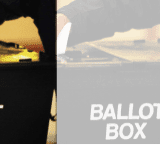
Let the hand-wringing begin! In last week’s primary election, just over 16 percent of Los Angeles voters turned out at the polls, less than four years ago, which was less than the election before that, which was less than the election before that – and on and on. In Southern California municipalities – big city or small – elections draw about 20 percent of the vote. This is a problem in a democracy.
Low turnouts mean that more and more money gets spent on fewer and fewer voters, and when only a small minority of voters go to the polls, elected officials make major policy decisions based on a narrower group of constituents. In a democratic society, where people are empowered to make decisions that affect their lives, fewer voters mean diminished participation and less accountability.
In the early 1980s, when reformers first took a majority of seats on the City Council in Santa Monica,
» Read more about: Diminishing Returns: Where Have All the Voters Gone? »


(Lisa Schiff is a member of Parents for Public Schools of San Francisco. Her post first appeared in BeyondChron and is republished with permission.)
A friend of mine emailed me last fall incredibly worried about the impact of potential sequestration cuts on schools and students across the country. He was a long-time Washington D.C.-based public education advocate, so I was simultaneously unshaken and unnerved by his concern. Sequestration seemed like a D.C.-based fear, so unlikely to actually happen given the blowback that would surely come from such imprecise cuts. But my friend’s many years of fighting for resources for children’s education meant that I couldn’t really ignore his concerns, and so his words remained a low-level worry until March 1, when I had to concede that he’d been right all along.
Funding for shared needs like education is always at risk and the past few weeks have highlighted just how great that risk is.
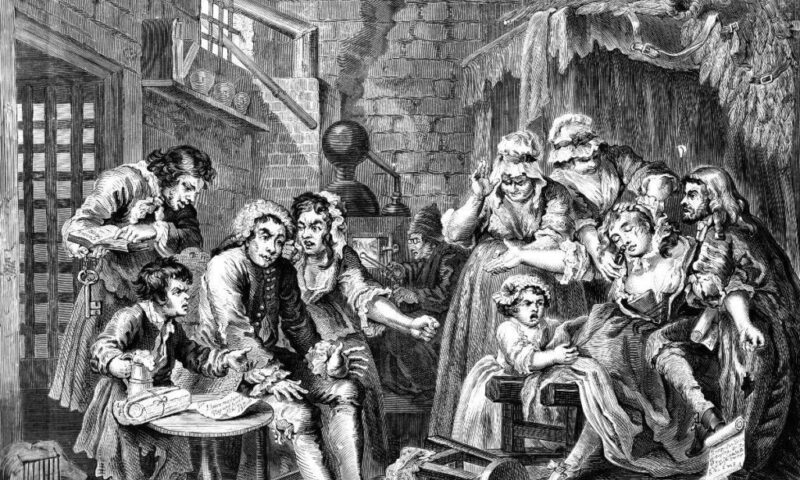
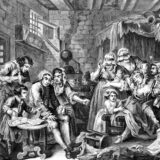
Shoddy political theater distracts people with vague demons called debt ceiling, fiscal cliff and now, sequester. Party leaders posture for major donors, media boosters and the faithful. They claim to save us from the demons. Meanwhile, backstage they all agree on austerity as the “necessary” response to “our major problem,” namely federal budget “imbalance.” “We” are spending “beyond our means,” accumulating “government debts.” So “we” must raise taxes and cut spending – impose austerity – to regain balance.
On January 1, payroll taxes rose (from 4.2 to 6.2 percent) for 150 million Americans. Their checks shrank as that regressive tax became more so. Obama’s hyped “tax increase for the rich” was comparatively trivial. It affected only the very few Americans earning over $450,000, raising their top tax rate from 35 percent to 39.6 percent. Our leaders hope we forgot the 1950s and 1960s, when the top tax rate was 91 percent. On March 1,


 To the let’s-cut-entitlements crowd, what’s wrong with America is that seniors are living too high off the hog. With the cost of medical care still rising (though not as fast as it used to), the government is shelling out many more dollars per geezer (DPG) than it is per youngster (DPY). The solution, we’re told, is to bring down DPG so we can boost DPY.
To the let’s-cut-entitlements crowd, what’s wrong with America is that seniors are living too high off the hog. With the cost of medical care still rising (though not as fast as it used to), the government is shelling out many more dollars per geezer (DPG) than it is per youngster (DPY). The solution, we’re told, is to bring down DPG so we can boost DPY.
We do indeed need to boost DPY. And we need to rein in medical costs by shifting away from the fee-for-service model of billing and paying. But as for changing the way we calculate cost-of-living adjustments for seniors to keep us from overpaying them — an idea beloved of Bowles, Simpson, Republicans and, apparently, the White House — this may not be such a hot idea, for one simple reason: An increasing number of seniors can’t afford to retire.
Nearly one in five Americans age 65 and over — 18.5 percent — were working in 2012,


Janice Slaughter often takes her 19-month-old granddaughter to the Tiny Tots child care center in Jackson, Mississippi, or picks her up in the afternoon so that her daughter, the baby’s mother, can attend school.
Slaughter brought her own children to the same center when they were babies and has known the owner for years.
But, soon, she and her daughter, who receives a federally funded child care subsidy administered by the state, will be required to scan their fingers on a device at Tiny Tots whenever they bring in the baby or pick her up. Everyone else will just walk right in and out.
Susan Williams scans her finger when she picks her daughter up from child care in Jackson, Mississippi. “I don’t mind it, but I really don’t see the point in it, I don’t understand why it’s necessary,” she said. “You have to stand in line and wait for it.”
“It’s inconvenient,
» Read more about: Fingerprinting Indigent Mothers and Other Shaming Rites »
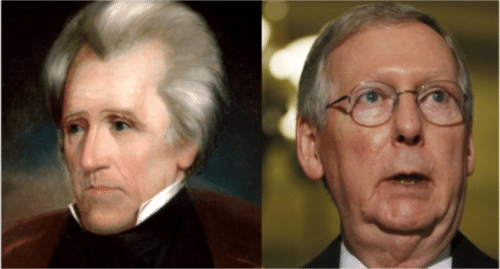
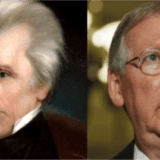
I don’t know if Senate Minority Leader Mitch McConnell or House Speaker John Boehner read much history.
But this old history teacher wonders if the GOP’s stubborn refusal to seriously negotiate with the Democrats over the sequester cuts is more cribbing from Andy Jackson’s 1824 political playbook.
That year, Old Hickory lost the presidency to John Quincy Adams. Immediately, Jackson set out to make Adams a one-termer.
Jackson sent the word to pro-Jackson members of Congress: If Adams is for it, oppose it. If he’s against it, support it.
Jackson unseated Adams in 1828.
No sooner was Barack Obama elected president in 2008 than McConnell said the GOP’s top political priority was beating him in 2012. “Amens” rose from Boehner and the rest of the party. GOP lawmakers got their marching orders: If Obama’s for it, we’re not, and vice versa.
» Read more about: History Games: The Sequester as Punishment »


 Searching for Sugar Man, the Oscar-winning documentary film by Swedish director Malik Bendjelloul, hits you in the heart. You walk out of the theater feeling the world can be redeemed — and that it is possible for a person to be recognized for their talents and contributions even after years of obscurity and seeming inconsequence. If it could happen to a musician called Rodriguez then, perhaps, it could happen to the hundreds of other equally talented and modest people in this world.
Searching for Sugar Man, the Oscar-winning documentary film by Swedish director Malik Bendjelloul, hits you in the heart. You walk out of the theater feeling the world can be redeemed — and that it is possible for a person to be recognized for their talents and contributions even after years of obscurity and seeming inconsequence. If it could happen to a musician called Rodriguez then, perhaps, it could happen to the hundreds of other equally talented and modest people in this world.
Sixto Rodriguez, so named because he was the sixth child born to his mother, was a handsome, lithe, enigmatic singer/songwriter in 1970s Detroit who released two albums of haunting, alienated songs and then seemingly sank into oblivion. Except one of his albums made it to Cape Town, South Africa and got passed hand to hand where its songs were picked up by the anti-apartheid music scene as anthems of a sort for a generation.
» Read more about: Films in Review: “Searching for Sugar Man” »